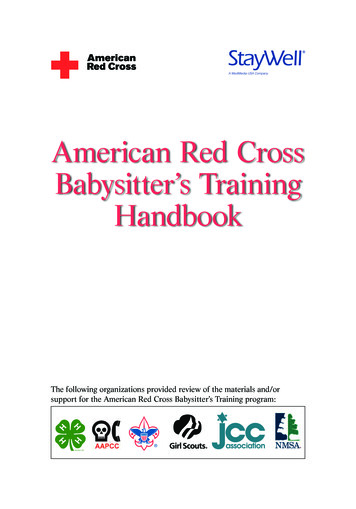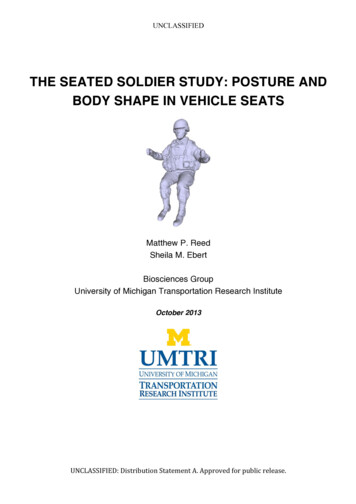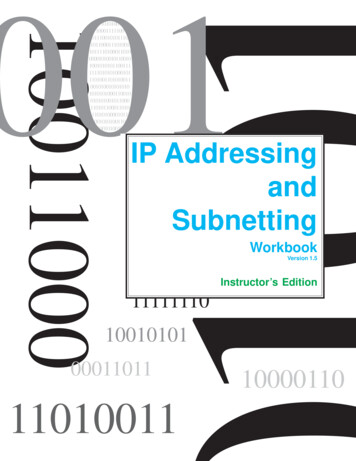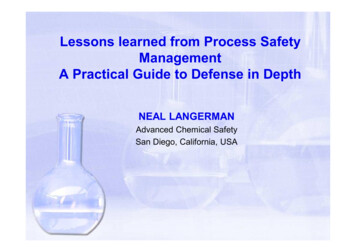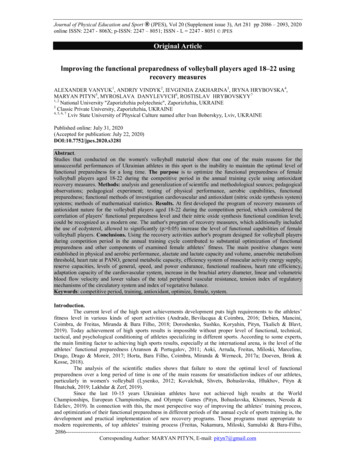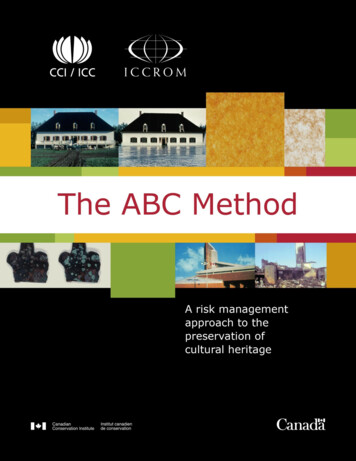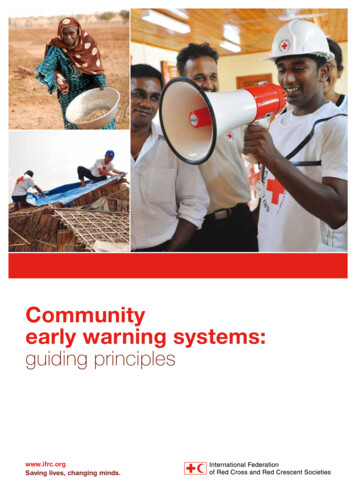
Transcription
LEADING WITHPURPOSE, POSTURE, & PREPAREDNESSKEN BRADDYMICHAEL KELLEY DWAYNE MCCRARYIntroduction by Allan Taylor
Ken Braddy served as an education pastor for 18 years prior to joining LifeWay.Ken blogs daily about Bible study groups at kenbraddy.com. He is married toTammy and has two sons and a grandson, Logan. Ken manages LifeWay’songoing Bible studies for adults and provides oversight to its Sunday Schooltrainers. He is an experienced conference leader and has co-written several bookson Sunday School. His latest book, Breathing Life Into Sunday School, releases inApril 2019.Michael Kelley lives in Nashville, Tenn., with his wife, Jana, and three children:Joshua, Andi, and Christian. He serves as the Director of Groups Ministry forLifeWay. As a communicator, Michael speaks across the country at churches,conferences, and retreats, and is the author of Growing Down: Unlearning thePatterns of Adulthood that Keep Us from Jesus, Wednesdays Were Pretty Normal:A Boy, Cancer, and God; Transformational Discipleship; and Boring: Finding anExtraordinary God in an Ordinary Life.Dwayne McCrary helps create Bible study resources for adults at LifeWay,teaches Sunday School in his church, and is an adjunct professor at MidwesternBaptist Theological Seminary. He is married, has two children and twograndchildren. Prior to coming to LifeWay, Dwayne served on church staff for22 years. He is an experienced conference leader and writer and enjoys bicycling. 2018 LifeWay PressPermission is granted to photocopy this resource. Free downloadable versions areavailable online at lifeway.com/TrainingResources or the iTunes store.ISBN 978-1-5359-5036-7Item 005813657 (PDF: 005813661)Dewey decimal classification: 268.0Subject headings: SUNDAY SCHOOLS/RELIGIOUS EDUCATIONUnless otherwise noted, all Scripture quotations are taken from the ChristianStandard Bible , Copyright 2017 by Holman Bible Publishers. Used bypermission.Printed in the United States of America2
ContentsIntroduction: Saddle Up and Ride . 5What should our Sunday Schools do?Chapter 1: Our Purpose.9Why do we do what we do?Chapter 2: Our Posture.25How do we set the standard for others to follow?Chapter 3: Our Preparation.39What do we do to prepare ourselves and our groups to make disciples?Challenge.55Endnotes . 57Chapter Overviews.593
Introduction: Saddle Up and RideAllan TaylorPerspective determines how we see things. A proper perspective gives usthe capacity to view the relative importance (or lack thereof) of somethingor someone. A proper perspective is indispensable in determining the truevalue.The “Sunday School horse” has been around for some time and carries aproven track record. Few can dispute the impact of Sunday School over theyears. But you don’t saddle, and eventually mount, a horse that you don’ttrust. You only saddle and ride a horse in which you have confidence. Yousee, your perspective of the horse determines your use of the horse.For some, Sunday School brings up images of a bygone era, of anorganization best suited for children, or of large classes dominated by aninformation-rich lecture. Let me offer a different perspective of SundaySchool that is filled with purpose and hope. To me, Sunday School isabout making disciples. This discipling takes place as a group of peopleseek to reach people, teach people, and minister to people.Let me pause and explain what I mean by Sunday School. I’m talkingabout Bible study groups that meet every week mostly on Sunday eitherbefore or after a worship service. Your church may call these Bible studygroups by some other name, so just substitute that name every time yousee the term “Sunday School.”In Matthew 4:23 and 9:35, we find Jesus reaching, teaching andministering to people. When we are busy reaching people, teachingpeople, and ministering to people, we are in the same business as Jesus.It just doesn’t get any better than that! This type of work will never beoutdated or irrelevant in this world.The writer of Proverbs declared that “a horse is prepared for the dayof battle, but victory comes from the Lord” (Prov. 21:31). This proverbpoints to two different ways we fail. First of all, we fail to prepare thehorse. We expect God to do all the work while we sit, watch, and wait.SADDLE UP: Leading with Purpose, Posture, Preparedness5
God offers us the opportunity to be involved in the battle with Himleading us to victory, but that means we need to saddle the horse. Thesecond way we fail is by depending solely on our horse to carry us tovictory. The victory is not ours. We are involved in God’s work and mustbe careful to always follow His lead and point to Him as Victor.Keeping these two things in mind also gives us perspective when itcomes to Sunday School. We are responsible for putting ourselves in aposition to be used by God. We also must keep our focus on God and Hiswork in the process. His work is about making disciples and that should beour work as well.ReachingNumerous Sunday School leaders have led the way in reaching people.These leaders kept reaching the lost at the forefront of the Sunday School.They understood that God’s heart for lost people and His calling on Hischurch made this reaching of significant importance. Therefore, theywould not excuse the Sunday School of this God-given priority, nor shouldwe. They understood tactically the value of the Sunday School shoulderingthe responsibility of reaching people.God calls every believer to be a missionary. Sunday School gives usa means for treating them like missionaries. Every Bible study groupfunctions as a mission team as they reach lost, unchurched, and spirituallydetached persons in their community.Historically, baptisms increase when Sunday School focuses on reachingpeople. History shows that it takes less of us to reach more people with thegospel when the Sunday School focuses on reaching people.Strategically, Sunday School is the best reaching approach we have.Why? People are placed in a group that matches their stage in life. TheBible is taught on an age-appropriate level. In Sunday School, disciplemaking (reaching and teaching) is seen as one action. Sunday Schoolcreates a means for getting everyone personally involved in reaching anddiscipling others. Each of these factors contribute to the strategic nature ofthe Sunday School.6SADDLE UP: Leading with Purpose, Posture, Preparedness
TeachingSunday School is all about the Book—the B-I-B-L-E! Standing front andcenter of the Sunday School ministry is the Word of God.Sunday School is easily recognized for its contributions in getting Bibletruth into the lives of her attendees. If Sunday School was appreciated forno other reason, the faithful teaching of the Word of God would be plentyreason enough! Through the Word, we come to faith (Romans 10:17).Through the Word, we are sanctified (John 17:17). Through the Word, weare kept from sin (Psalm 119:11). Through the Word, we receive God’sdirection (Psalm 119:105). When all else fails, the Word of God remainsreliable (Psalm 119:89). Teaching takes place best when God’s powerfulWord comes together with a prepared teacher and participating class thatseeks to live out what they discover in practical application.MinistryMinistry best takes place in the context of relationships. No onecan minister to you better than those with whom you are connectedrelationally. Each of us just came out of a storm, are in a storm, or areheaded into a storm. Our sin-cursed world leaves none of us exempt. Inthese stormy times we come to know and appreciate the ministry of dearfriends who love us.If God sends us His children, then He expects us to take care of them.No other ministry is structured to care, minister, and restore people likeSunday School. Therefore, every Sunday School class should minister tothe whole person—physically, emotionally, spiritually, & financially.Requirements for Making DisciplesSunday School is the greatest venue the church has for laying a foundationfor people to be discipled. Three realities impact why this is true.SADDLE UP: Leading with Purpose, Posture, Preparedness7
First of all, discipleship best takes place in a small group. Jesus was thegreatest discipler of all time. How did Jesus go about discipling others?He chose a small group of twelve men to pour Himself into. He preachedto the multitudes, but He committed Himself to His disciples. SundaySchool places people in a small group where they can be known, taught,mentored, and ministered to.Second, discipleship best takes place in the presence of a discipler. Thetwelve were with Jesus, doing life together. Jesus’ disciples learned fromHim as He taught, but they also learned as they watched Him. SundaySchool places believers with other believers in an “iron sharpening iron”setting. We learn from each other as we glean spiritual truth from oneanother.Third, discipleship best takes place when disciples are sent. The goalof discipling others is to produce more disciples who will disciple others.The twelve were sent to reach more disciples. They matured their way toministry, but they also ministered their way to maturity as the MasterDiscipler gave them assignments. Sunday School is a place where everyonecan get involved in ministry.As you can see, I believe the Sunday School horse is worth mounting!My prayer is that this book will open our eyes to see afresh the purpose,posture, and preparation required for an effective Sunday School. Weneed to re-embrace the value of Sunday School, even in an ever-changing,contemporary church so we can gain the maximum benefit from our ride.My friends, Ken Braddy, Michael Kelley, and Dwayne McCrary haveridden this horse before. They know and understand how to use SundaySchool. Collectively, they have many years with this horse and have taughtthousands of others how to ride this horse. Take the time to reflect onwhat you read and glean from the wisdom of these men.Saddle up and enjoy the ride!8SADDLE UP: Leading with Purpose, Posture, Preparedness
Chapter 1: Our PurposeKen BraddyWhy do we do what we do?Knowing why we do something is important. You might even say that itis critical and foundational. Without a clear understanding of our purposefor doing a certain thing, we can easily experience mission drift, or worse,apathy.The legendary Green Bay Packers coach, Vince Lombardi, was famousfor focusing his players on the fundamentals of football. Lombardibelieved that the game of football could be boiled down to blockingand tackling. That’s it. No need to complicate things. He gathered hisplayers at the beginning of each season and told veterans and new playersalike, “Gentlemen, this is a football” as he held one for them to see. Heexplained that ten yard gains led to first downs and with enough successivefirst downs, they would score points. Points would win games. Thepurpose of the team was to work together to block and tackle, advance thefootball, and score points. He never let his players forget the mission. Theirpurpose was clear.Lombardi’s focus on purpose became the stuff of legends. It worked outpretty well for him; the pro football trophy bears his name. Perhaps wecould learn some things from his example.Start with “Why?”Why does your Sunday School exist? What is its purpose? Why does yourchurch take the time and trouble to have such a ministry to members andguests? Think about this for a moment, and then record your response.SADDLE UP: Leading with Purpose, Posture, Preparedness9
The purpose of our Sunday School is:In his book, Start With Why, Simon Sinek makes a compelling argumentthat organizations must think about their “Why.” He emphasizes thatorganizations need to be able to articulate why they do what they doand start a conversation about their why to reach new customers andlike-minded people. He states:“Very few people or companies can clearly articulate WHY they do WHATthey do. When I say WHY, I don’t mean to make money–that’s a result.By WHY I mean what is your purpose, cause or belief? WHY does yourcompany exist? WHY do you get out of bed every morning? And WHYshould anyone care?” 1My church recently established a new members’ class. At first we toldguests and potential members about the “what” of Sunday School. Wetalked about class options, curriculum, and a host of other things. Then wechanged the conversation and started with the “why” of Sunday School.Why does it matter? Why do we do it each week? Why do we set asidesignificant portions of our annual budget to make it excellent? Why dowe want men, women, boys, and girls to be members of a group? Startingwith the “why” of the purpose of Sunday School has resonated with bothour staff and our potential members. The “why” has helped us connectpeople to the “what.”10SADDLE UP: Leading with Purpose, Posture, Preparedness
The “Why” of Sunday School: Make DisciplesJesus began His public ministry with a dip in the Jordan River. He heardHis Heavenly Father’s voice, witnessed the Holy Spirit descending like adove, and felt His Father’s affirmation and joy as He began His salvationbringing mission. His final words to His disciples just prior to His postresurrection ascension are known by Christians all over the world. He toldus to “Go, therefore, and make disciples of all nations, baptizing them inthe name of the Father and of the Son and of the Holy Spirit, teachingthem to obey everything I have commanded you” (Matt. 28:19-20).Our Sunday Schools are tasked with many assignments: teach people,reach people, and care for people, to name a few. But at the center of it allis the command and the mission of making disciples. Hopefully you wrotesomething like that earlier as you thought about why your church hasSunday School.Review the purpose you recorded earlier. How does yourpurpose statement reflect the making of disciples?If you think of the command to make disciples as an “umbrella”command, contained within and underneath that umbrella is the task ofevangelism. We make disciples as we share the gospel. Sunday Schoolteachers share the gospel as they teach. They also share the gospel as theygo. Every teacher should be an evangelist. Notice that I didn’t say everyteacher should have the spiritual gift of evangelism! We are all chargedwith the responsibility of sharing the gospel. We are all evangelists evenif we do not have the gift of evangelism (2 Tim. 4:5). Some of us have asupernatural spiritual gifting that makes it easier to share the good newsor to share it more clearly and creatively. But we must all respond to theLord’s command to go and make disciples by sharing with those who havenot heard the gospel.SADDLE UP: Leading with Purpose, Posture, Preparedness11
Why do we have Sunday School? If we start with the “why,” the answermust be “to make disciples by sharing the gospel.” We’ll put people ingroups with others of a similar age or life stage. We’ll teach them tounderstand and obey God’s Word. We’ll fellowship with them. We’llpray for them and they’ll pray for us. We’ll serve alongside them as weengage in serving others. But we do these many Sunday School tasks as aresponse to and an expression of the command to go and make disciples.Sunday School is the strategic tool our churches use to share Jesus with thespiritually lost. It’s the largest organization in practically every church. Ithas a place for every member and guest to belong. It makes sense that weshould focus on making disciples, which starts with evangelizing them.There’s the heart of disciple-making—evangelism. This was why Jesuscame: to seek and to save the lost (Luke 19:10).Robby Gallaty, pastor and author of Growing Up: How to Be a Disciples WhoMake Disciples, says,When the church becomes an end in itself, it ends. When Sunday school, asgreat as it is, becomes an end in itself, it ends. When small groups ministrybecomes an end in itself, it ends. When the worship service becomes an end initself, it ends. What we need is for discipleship to become the goal, and thenthe process never ends. The process is fluid. It is moving. It is active. It is aliving thing. It must continue to go on. Every disciple must make disciples. 2There again is the “why” of Sunday School! It’s not just somethingwe do on a Sunday morning because we’re already at the church. It’snot something we do to meet our needs. Sunday School exists tomake disciples. It should be our expression of obedience to The GreatCommission. Period.Inherent in Making Disciples is ChangeJust what makes a disciple? How would you define that term to someonewho asked you, “What is a disciple?” To begin with, all Christians aredisciples. That’s the way the New Testament presents them. But I willagree that some disciples are not growing disciples. They should bematuring, but they are not. That doesn’t mean they are not disciples. Theyare simply disciples who are not advancing in their faith like some of their12SADDLE UP: Leading with Purpose, Posture, Preparedness
fellow disciples. So what does a growing disciple look like? What kind ofchanges might you see?Jim Putman and Bobby Harrington point to Jesus’ calling of His firstdisciples to demonstrate three changes that take place in disciples:1. “Follow Me” is the head. God changes the way disciples think. Beforebecoming a disciple, the person is in charge of his or her actions anddecisions. Becoming a disciple requires a different way of thinking. Thischange happens because disciples realize that they must radically committhemselves to Jesus. A disciple’s thinking changes as a result.2. “I will make you” is about the heart. Jesus takes His new disciples andbegins to change their affections. We learn to love what He loves; we learnto hate what He hates. Jesus remakes us from the inside out. Things weonce clung to lose their appeal as we focus on pleasing the One who savedus from our sin.3. “Fishers of men” involves the hands. When Jesus told His first disciplesthat He would make them fish for men, He was talking about changingtheir day-to-day vocation. He, as their rabbi, would give them new thingsto do. No longer would they carry on as fishermen in the traditional sense.Now they would become evangelists and disciple makers as they fishedfor the souls of people. Jesus changed their day-to-day activities, as Hecontinues to do with us today. 3Using the images of head, heart, and hands helps us remember thesethree big areas of change that should be evident in our lives, and the livesof other disciples. We should be able to see change in the people we lead inour Bible study group, too. We can use the head-heart-hands illustrationto help gauge our growth as disciples.How might the three images of head, heart, and handsbe used to evaluate the growth of a disciple?SADDLE UP: Leading with Purpose, Posture, Preparedness13
Sunday School is Foundational DiscipleshipI watched my home being built several years ago. My wife and I selectedthe lot, the brick color, carpet, cabinetry, appliances, and other thingsimportant to us. The one thing I didn’t have a say in? The foundation ofthe house.Someone deep within the company from which I purchased myhome made the decision about my house’s foundation. They decided theappropriate engineering procedures to drill down into rock. They decidedon the depth of the foundation, the mixture of concrete and water, and thetime it needed to cure. Unless the foundation was laid properly, everythingbuilt upon it would be for naught. Without a proper foundation, my housewould have eventually shifted and possibly collapsed. Thankfully, myhouse was built on a strong foundation laid with great intentionality andcare. I am grateful that someone much smarter than me knew how to lay asolid foundation. It is so important.When it comes to Sunday School, we must understand that it isfoundational discipleship. Sunday School is designed to intentionally be aplace where we teach the basics of the Bible. There is a difference betweensimple and simplistic. We must tell the gospel story and help peopleunderstand what God’s Word says. We shouldn’t over communicate, butwe should communicate in the simplest terms possible, not leaving anyonebehind, and not assuming everyone in our group has our level of biblicalknowledge. Jesus should find us “teaching them to observe everythingI have commanded” (Matt. 28:20). So we approach Sunday School andthe study of God’s Word with a degree of fear and trembling. It is a holytask to teach God’s Word to His people. We stand with our pastor as coteachers of God’s Word. The Holy Spirit leads and guides His people intoall truth through teachers like you and I (John 16:13).Implications of Foundational DiscipleshipIf Sunday School is foundational discipleship, what are the implicationsfor us? How might we go about making sure that Sunday School is doingits job of laying a good, solid foundation in disciples’ hearts and lives?14SADDLE UP: Leading with Purpose, Posture, Preparedness
To begin with, foundational discipleship means we resist the urge toalways “go deeper.” If you ever hear people saying something like, “SundaySchool isn’t deep enough,” then you have a problem on your hands.This is an indicator that the people in your church don’t understand themission of Sunday School: making disciples. As we said earlier, makingdisciples requires evangelism. Sunday Schools that are evangelistic willhave new believers in groups. Those new believers will sit next to moremature (and maturing) believers. The new disciples will listen, watch,and study alongside more mature Christians. These newer believers needfoundational studies. If you feel that your group “just isn’t deep enough,”may I suggest you leave that group and start a new one? Most adultswho sit in Sunday School groups are educated well beyond their level ofobedience. It’s time for tens of thousands of group members to step up andstep out to start new groups and disciple new believers.Secondly, foundational discipleship means we choose trustworthyongoing curriculum. Bible study series produced by Christian publisherslike LifeWay craft studies with great intentionality. The studies aredesigned to be balanced and to be based on a study plan that helpsdisciples mature in their understanding and obedience to God’s Word.Lastly, foundational discipleship means we keep the attention of ourgroups focused outwardly. In a conference setting, I once asked a groupof teachers to form circles of about eight to ten people. I instructed themto hold hands, which they did. And they did so just as you might expect;they circled up, joined hands, and faced the inside of their circles. Iasked them, “Is there another way that you might form a circle and holdhands?” In time, each of the groups shifted position and turned aroundto face outward, still holding hands. As they stood there in each other’sgrasps, I said, “This is what you must do as teacher-leaders, keep yourgroup members’ attention focused outwardly.” I explained that in time,most groups tend to turn inward. I saw this happen with the group Irecently led. It takes very strong leadership to constantly remind ourgroup members that we exist as Sunday School groups, in part, for thepeople who are not yet here. The tendency is to turn inward and believethat Sunday School exists solely to take care of our needs and to take usto incredible depths of study. May it never be so! Sunday School existsto make disciples, and that requires that groups focus their attentionoutwardly on the lost.SADDLE UP: Leading with Purpose, Posture, Preparedness15
How do you see the three implications for foundationaldiscipleship playing out in your class?Making Disciples Means Openly Enrolling ThemIn order to make disciples, it helps to enroll people in our Bible studygroups. Dr. Harry Piland, former director of Sunday School at LifeWay,was a proponent of enrolling lost people in Sunday School groups. Dr.Piland made the following observation.One of the best ways to reach out and touch this vast unreached populationis to get people involved in Bible study. We can do so by enrolling them inSunday school To reach means to enlist and involve persons in Bible study.It means enlisting and involving unsaved persons, unchurched Christians,members of a church who are not part of the Bible teaching program, andchildren of these groups. 4Enrolling people in Bible study means we must change the conversationwhen a guest comes to our Bible study session. In a typical adult group,the secretary for the group might ask the guest to fill out an informationcard of some kind. Rather than simply asking for information, what if theconversation went something like this: “We’re so glad you chose to cometo our group today! We’d love to have your permission to place you on ourgroup’s ministry list. You are not making a commitment to the church, norare you joining the church. You’re giving us permission to pray for you andyour family and to keep you in the loop about our group’s activities. Wouldyou allow us to do that for you?” We communicate that we want themto be a part of the group. They are potential members first, and guestssecond.16SADDLE UP: Leading with Purpose, Posture, Preparedness
Open Enrollment and Open GroupsSunday School groups function best as open groups. In fact, SundaySchool groups are designed to be open groups. I once heard a teacher say,“Our group is an open group; it’s a friendly group.” Being an open grouprequires that, of course, and much more. Being an open group means: They are open to new people attending each time the group comes togetherfor Bible study. They pray for and expect new people to attend the group. They intentionally choose ongoing curriculum where each Bible study sessionstands alone as a complete Bible study experience. They wear name tags to make it easier for guests to relate to group membersand vice versa. They have extra chairs and room for guests. They have extra curriculum for guests.Open enrollment goes together with open groups because we do notrequire a guest to visit several times before they can join a group. Infact, we might enroll someone at a time and place away from the churchcampus! If we discover a friend, neighbor, coworker, or acquaintance whois not in an ongoing Bible study group, we could invite them to belong toour group wherever they are – at a restaurant having lunch with us, sittingin the bleachers as our kids play a sport, or even in the office break room.Open means open to enrolling people any time and any place with thepurpose of getting them connected to a Bible study group where they canlearn what it means to be a disciple.What is the relationship between open groupsand open enrollment? How do they support each other?Can you have one without the other?SADDLE UP: Leading with Purpose, Posture, Preparedness17
Principles for Making DisciplesSince our goal in Sunday School is to make disciples, there are a fewprinciples that we should acknowledge. These principles are just that—principles—and they transcend ministry context, church size, and otherfactors. In this sense, they are universal principles that we all mustrecognize as we go about Sunday School’s primary task of disciple making.1. Disciples are made in smaller groups.I am completely convinced that smaller groups are best for makingdisciples. That conviction comes from years of observing groups, and fromyears of leading my own Sunday School group. Larger groups becomeplaces for people to hide out. While a guest may prefer to be incognito, itis actually best for them if they build relationships with fellow disciples.The formation of friendships happens best in smaller groups. In additionto this, smaller groups encourage “conversational community.” We’ve allbeen in larger groups dominated by one or two outspoken individuals. Therest of the people simply sit and listen and participate minimally.Perhaps the most important thing I could say about the need for peopleto be in smaller groups is that it appears to be Jesus’ model for makingdisciples. Jesus primarily related to a group of twelve disciples and then toa smaller group of three disciples. If preaching to the masses was the wayto make disciples, wouldn’t Jesus have asked His own band of disciples torent the local amphitheater and invite hundreds or thousands to hear Himpreach? Sure He would have. But He didn’t. He spent His days relating toa small group of disciples and only occasionally spoke to very large crowds.2. Making disciples requires proximity.You can’t make disciples from a distance. Robby Gallaty, pastor at LongHollow Baptist Church, says,Preaching to make disciples is like going to the nursery and spraying cryingbabies with milk and saying you just fed the kids discipleship involves morethan preaching and listening. 5If we want to feed a baby, we must hold them close. Making disciplesrequires that same kind of proximity. It is about relationships.18SADDLE UP: Leading with Purpose, Posture, Preparedness
3. Growing disciples read God’s Word daily.Through a massive research project done for the book, The Shape of Faith toCome, Brad Waggoner discovered that growing disciples place themselvesin a posture to grow spiritually year-over-year by several key habits.Regularly attending a Bible study group and the church’s weekend worshipservices were the second and third most common factors in growingdisciples. The most prevalent factor was daily Bible engagement! 6 Discipleswho immerse themselves in God’s Word daily are in a strong position
My prayer is that this book will open our eyes to see afresh the purpose, posture, and preparation required for an effective Sunday School. We need to re-embrace the value of Sunday School, even in an ever-changing, contemporary church so we can gain the maximum benefit from our ride. My fri
